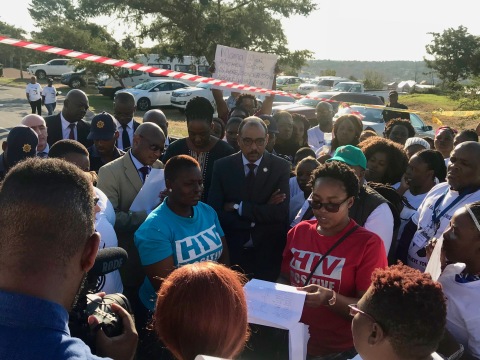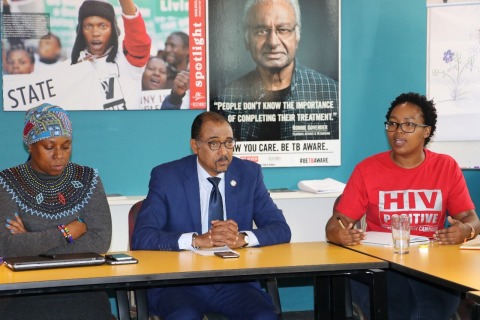JOHANNESBURG--(BUSINESS WIRE)--UNAIDS Executive Director Michel Sidibé has decided to stick to his post for as long as possible despite calls for him to resign over mishandling sexual harassment allegations against his former deputy director and alleged attempts to cover up and meddle with the subsequent investigation. Inexplicably, UN Secretary-General António Guterres has voiced his full confidence in the beleaguered executive director and has done little to address the agency’s deteriorating leadership crisis.
Secretary-General Guterres will only be able to ignore appeals by civil society for so long, as the pressure on Sidibé to step down continues to grow. Most recently, editor-in-chief of The Lancet Dr. Richard Horton has called for the UNAIDS chief to be suspended.
Sidibé, who is accustomed to receiving accolades and praise around the world, was met by an angry crowd of over 100 South African women activists on May 9, outside the Pan-African Parliament near Johannesburg. Their shouts, dances and signs were deafening as they delivered an unequivocal message – Michel Sidibé must go.
Sidibé was overcome with emotion when he came outside to face the protesters after they had been chanting for two hours. The women encircled him and read aloud demands outlined in a recent letter by 23 feminists, which included a call for leadership change and substantive reforms on sexual harassment policies and practices within UNAIDS. The letter became a de facto memorandum for the protest after more than 100 activists endorsed it at the South African National AIDS Council Civil Society Forum session immediately prior to the demonstration.
Sidibé was visibly taken aback by the confrontation with the group and meekly stood by while the memorandum was read aloud. The group informed him that they intended to hold a press conference the following day to brief the media on their demands. Sidibé asked to meet with key activists prior to the press conference, a request which the group granted.
In the meeting on May 10, a small group of African feminist activists, including women leaders from Treatment Action Campaign, Positive Women's Network, AIDS Healthcare Foundation (AHF) and other prominent organizations once again met with Sidibé and pressed him to step down.
The group criticized him for failing to implement real reforms beyond his so-called five-point plan to address harassment at UNAIDS. They characterized the plan as a public relations smoke screen and reiterated their firm support for Martina Brostrom, a UNAIDS employee who first made public allegations of sexual harassment against Louis Loures, Sidibé’s former deputy director, in March 2018.
“[Sidibé] arrived early for the meeting looking fairly trepidatious, listened to concerns and grievances raised, then he apologized specifically for his mishandling of the situation – but indicated that he will not tender his resignation,” said Larissa Klazinga, AHF Policy and Advocacy Manager for Southern Africa, who attended the meeting. “As activists we were conscious to not allow the meeting to be co-opted or have it be used as a PR stunt. We concluded the meeting and resolved to consult with the original group of 23 women on further actions.”
“As pressure continues to mount on Sidibé to quit, his refusal to do so only prolongs what has turned into an expensive crisis management exercise for UNAIDS public relations – we urge Secretary-General António Guterres to intervene immediately!” said Terri Ford, Chief of Global Advocacy and Policy. “With a growing number of sexual harassment and abuse claims surfacing across several UN agencies, UNAIDS would do well to quickly bring the scandal to a close by dismissing Sidibé and embarking on a program of comprehensive reforms. In light of his deplorable actions, remorse and apologies are too little, too late.”
AIDS Healthcare Foundation (AHF), the largest global AIDS organization, currently provides medical care and/or services to over 894,000 individuals in 39 countries worldwide in the US, Africa, Latin America/Caribbean, the Asia/Pacific Region and Eastern Europe. To learn more about AHF, please visit our website: www.aidshealth.org, find us on Facebook: www.facebook.com/aidshealth and follow us on Twitter: @aidshealthcare and Instagram: @aidshealthcare






